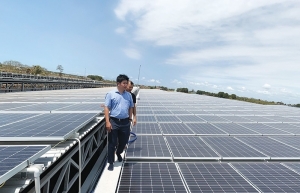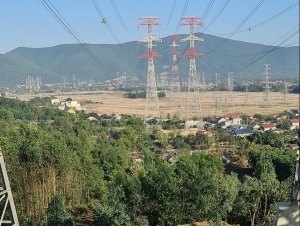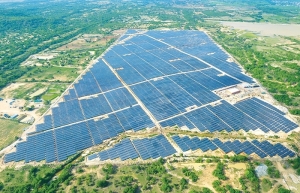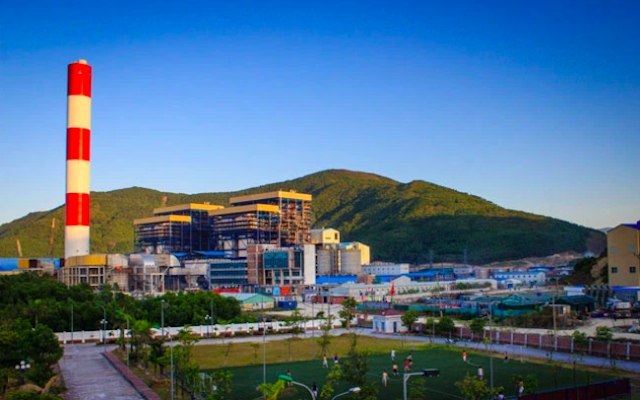Direct power purchase mechanism – a new entrant to be for Vietnam power sector
 |
| Vaibhav Saxena and Nguyen Lan Chi from Vietnam International Law Firm analyse the importance of the new rules to both participants and the power sector |
The Electricity Regulatory Authority of Vietnam under the Ministry of Industry and Trade (MoIT) has released a draft circular guiding the implementation of the pilot programme on the direct power purchase agreement (DPPA) mechanism between renewable power generation companies and power consumers.
Compared to the previous draft DPPA decision released at the beginning of 2020, the new draft circular still follows the virtual model where the power consumer will indirectly purchase power from the power generation company through the Vietnamese wholesale electricity market (VWEM); while introducing several new requirements for participating power generation companies and power consumers.
The circular is now under review and is expected to be promulgated in 2021. Under the draft, the DPPA programme will be piloted nationwide with a scale ranging from 400 to 1,000MW. If the total capacity of all qualified applications exceeds 1,000MW, then the interested participants of the programme (including power generation companies and power consumers) will be selected on a first-come, first-served basis.
Power generation companies and power consumers who wish to join the programme must jointly prepare and submit an application dossier as co-applicants and must satisfy several conditions.
As for the power generation company, it must own a grid-connected solar or wind energy project having an installed capacity of more than 30MW that has been included in the approved power development master plan. At the time of application for the DPPA pilot programme, it must already enter into a binding in-principle agreement with power consumer(s) and secure financial support for the power project from financial institutions or banks, evidenced by written documents.
The in-principle agreement shall follow the template provided under Annex 1 of the draft circular, in which the parties shall agree on the main contents of the DPPA (that is, power supply commitments and strike price) to be signed between the parties after being selected into the programme. In addition, the power generation company must put the relevant power plant into commercial operation and participate in VWEM no later than 270 working days after being selected for the pilot.
For power consumers, they must purchase electricity for industrial manufacturing purposes at the voltage level of 22kV or higher. Similar to power generation companies, consumers also need to demonstrate that they already have a binding in-principle agreement with a power generation company or companies.
At the time of application for DPPA pilot programme, the power consumer is required to make a commitment on renewable energy usage target and on the ratio of annual renewable energy consumption supplied by the participating power generation company or companies; to total annual energy consumption supplied by the power corporation (PC), which shall be at least 80 per cent in the first three years of participation in the pilot programme.
DPPA mechanism
Under the proposed mechanism, the power generation company will not directly sell the generated electricity to the power consumer. Instead, through the VWEM and in accordance with the relevant power purchase agreement (PPA), it will sell all generated electricity to Vietnam Electricity (EVN), which in turn will sell such electricity to PC, and the power purchaser will purchase the power generation company’s generated electricity from PC.
The sale and purchase of electricity on the VWEM will be conducted at the spot market price in accordance with the MoIT’s regulation on the operation of VWEM (that is, current Circular No.45/2018/TT-BCT dated November 15, 2018, as amended). As for the purchase of electricity from PC, the power consumer must pay PC additional DPPA services fees (including transmission fees, distribution fees, market operation and dispatch charges, and auxiliary services fees) which are calculated on each kWh.
The PPA between the power generation company and EVN shall terminate after 20 years from the commercial operation date of the power plant and as of date mainly follow the model PPA applicable to solar and wind projects, except for certain necessary modifications related to the DPPA mechanism.
In addition, the power generation company and the power consumer will enter into a DPPA in the form of a Contract for Differences with a term decided by the parties which shall be at least 10 years but not more than 20 years. The contract mainly governs the power supply commitments of the power generation company; and the strike price which the power consumer agrees to pay the power generation company.
If the agreed strike price is higher than the spot market price, then the power consumer shall pay the power generation company the differences between the agreed strike price and the spot market price. By contrast, if the agreed strike price is lower than the spot market price, the power generation company shall pay the power consumer such differences.
With the above mechanism, the risk of spot market price fluctuations can be eliminated, which is indeed beneficial for the power generation company. It will be easier for the power generation company to make a good and effective financial forecast for the power project.
Proposed timeline
The DPPA pilot programme is planned to be implemented for two years, from 2021 to 2023. However, when it will be launched will depend on the official promulgation of the DPPA circular by the MoIT after considering all opinions from relevant agencies and stakeholders. The timeline for implementation will tentatively be as follows:
● Within 15 working days after the DPPA Circular comes into effect, the MoIT will announce the DPPA pilot programme;
● Within 15 working days after the announcement, the MoIT will open the online registration portal;
● Within 45 working days after the opening of the online registration portal, power generation companies and power consumers will submit application dossiers through the online registration portal;
● Within 45 working days after the closing of the online registration portal, the MoIT will conduct evaluation and selection process and announce the list of selected power generation companies and power consumers;
● Power generation companies will complete the construction of the power plant and put the power plant into commercial operation within 270 working days after being selected for the programme;
● Based on the result of the programme which is evaluated during the period of one year starting from the expiry of the 270-working-days period mentioned above, the MoIT will report to the prime minister for his consideration and decision on official application of the DPPA mechanism.
The launch of the DPPA pilot programme is expected to bring a gigantic boost for the renewable energy power sector in Vietnam. Although the draft circular has not been finalised, the outcome is much awaited.
What the stars mean:
★ Poor ★ ★ Promising ★★★ Good ★★★★ Very good ★★★★★ Exceptional
Related Contents
Latest News
More News
- Vingroup consults on carbon credits for electric vehicle charging network (January 28, 2026 | 11:04)
- Bac Ai Pumped Storage Hydropower Plant to enter peak construction phase (January 27, 2026 | 08:00)
- ASEAN could scale up sustainable aviation fuel by 2050 (January 24, 2026 | 10:19)
- 64,000 hectares of sea allocated for offshore wind surveys (January 22, 2026 | 20:23)
- EVN secures financing for Quang Trach II LNG power plant (January 17, 2026 | 15:55)
- PC1 teams up with DENZAI on regional wind projects (January 16, 2026 | 21:18)
- Innovation and ESG practices drive green transition in the digital era (January 16, 2026 | 16:51)
- Bac Ai hydropower works stay on track despite holiday period (January 16, 2026 | 16:19)
- Fugro extends MoU with PTSC G&S to support offshore wind growth (January 14, 2026 | 15:59)
- Pacifico Energy starts commercial operations at Sunpro Wind Farm in Mekong Delta (January 12, 2026 | 14:01)





 Tag:
Tag:























 Mobile Version
Mobile Version